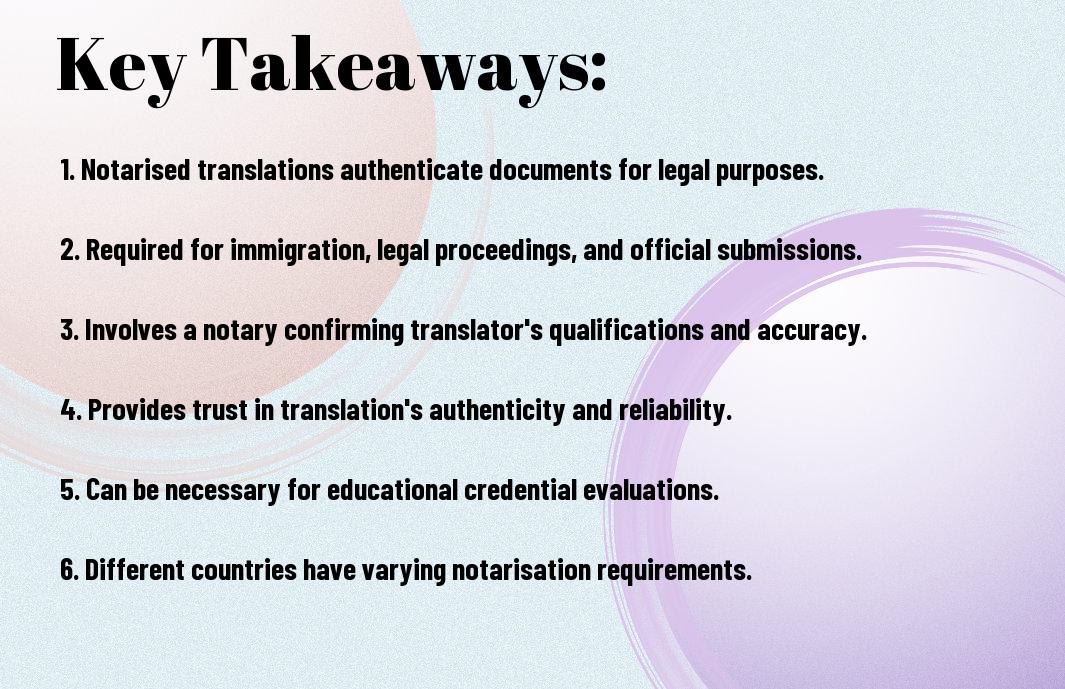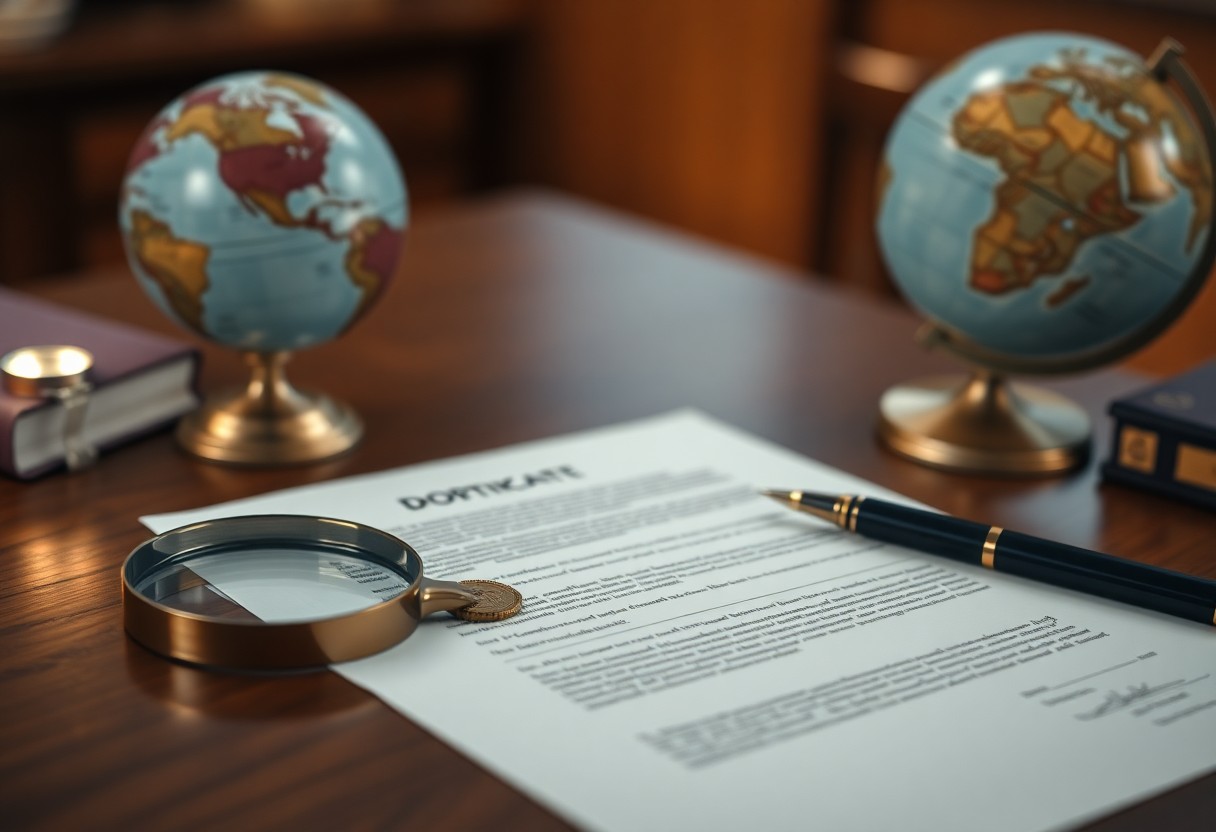Solicitor roles can often become confused with those of a Notary Public, yet they serve distinct purposes in the legal landscape. Understanding these differences is vital for you when navigating legal matters or seeking professional guidance. While solicitors provide legal advice and representation, notaries public focus primarily on witnessing documents and authenticating signatures. This blog post will clarify each professional’s responsibilities, helping you determine which service is suitable for your needs.
Key Takeaways:
- Role: A solicitor provides legal advice and represents clients in legal matters, while a notary public authenticates documents, acknowledges signatures, and performs other notarial acts.
- Qualifications: Solicitors typically require formal legal education and licensing, whereas notaries may need to undergo a specific certification process, which varies by jurisdiction.
- Responsibilities: Solicitors handle a wide range of legal issues, including litigation and contract law, while notaries focus on the prevention of fraud in document signing and ensuring the accuracy of notarized documents.
- Client Interaction: Solicitors engage directly with clients to provide tailored legal services, while notaries usually meet clients in more transactional settings to perform notarial duties.
- Legal Authority: Solicitors have greater legal authority to represent clients in court, while notaries primarily serve as impartial witnesses to signatures and do not represent parties in legal disputes.
Definition of a Solicitor
To understand the role of a solicitor, you should know that a solicitor is a qualified legal professional who provides expert advice and assistance on various legal matters. Unlike barristers who represent clients in court, solicitors typically handle a range of legal issues such as property transactions, wills, and family law. They are often the first point of contact for individuals seeking legal guidance.
Roles and Responsibilities
Above all, your solicitor acts as your advocate and advisor, representing your interests in various legal contexts. They are responsible for preparing legal documents, offering legal advice, negotiating on your behalf, and ensuring compliance with the law. Your solicitor may also represent you in lower courts and provide guidance throughout your legal journey.
Areas of Practice
Areas of practice for solicitors can vary widely, depending on their specialization and client needs. Many solicitors focus on specific areas such as family law, criminal law, commercial law, property law, or estate planning, allowing them to provide tailored advice and support.
Definition of areas of practice further illustrates that solicitors often explore into niche domains, offering expertise that can help you navigate specific legal challenges. For instance, if you’re going through a divorce, a solicitor specializing in family law can provide you with targeted assistance, while those dealing with property transactions will benefit from a solicitor who understands real estate law. This specialization ensures you receive high-quality legal counsel suited to your unique circumstances.
Definition of a Notary Public
Clearly, a Notary Public is an official authorized by law to perform various legal formalities, particularly in relation to the authentication of documents. Their primary role is to serve as an impartial witness to ensure that the signing of documents is carried out legally and without coercion, thus safeguarding the integrity of the notarized items.
Functions and Duties
To fulfill their role, a Notary Public performs a variety of functions including witnessing signatures, administering oaths, and certifying copies of documents. They also help to deter fraud by ensuring that the parties involved understand the documents they are signing, which adds a layer of security to legal transactions.
Scope of Authority
Public Notaries have specific powers defined by the laws of their jurisdiction, which can vary significantly. Generally, their authority allows them to serve various functions related to legal documentation and verification.
Definition of a Notary’s scope of authority involves an array of responsibilities like overseeing the signing of documents, managing affidavits, and providing certification for certain legal actions. However, a Notary Public cannot provide legal advice, represent clients in legal matters, or engage in activities outside their statutory duties. Understanding these boundaries ensures that you utilize their services effectively within the legal framework.
Key Differences Between Solicitors and Notaries Public
Now, understanding the distinctions between solicitors and notaries public can aid you in navigating legal processes more effectively. Solicitors represent clients in legal matters, providing advice and acting on their behalf in various situations. In contrast, notaries public authenticate documents and transactions, serving as impartial witnesses. Their roles, while both important, focus on different aspects of the legal system.
Legal Framework
Against this backdrop, the legal framework governing solicitors and notaries public differs significantly. Solicitors typically operate under a national law society or regulatory body, ensuring compliance with specific professional standards. Meanwhile, notaries public may have a more localized jurisdiction, often bound by state or municipal laws.
Types of Services Offered
Hence, the types of services offered by solicitors and notaries public vary widely. Solicitors provide a broad range of legal services including representation in court, contract drafting, and legal advice. In contrast, notaries public primarily focus on document notarization, verification of identities, and witnessing signatures. Their roles can complement each other in various transactions. Here are some common services provided by each:
- Solicitors: Legal advice and representation
- Solicitors: Contract drafting and negotiation
- Notaries Public: Document authentication
- Notaries Public: Witnessing signatures
- Notaries Public: Certifying copies of documents
Perceiving how these services intersect can help streamline your legal needs.
| Solicitors | Notaries Public |
|---|---|
| Legal representation | Document notarization |
| Client consultation | Verification of signatures |
| Contract management | Witnessing contracts |
| Dispute resolution | Certifying copies |
| Legal advice | Administering oaths |
You’ll find that each role provides vital services tailored to different legal needs, enhancing the overall legal process.
Professional Requirements and Qualifications
Your understanding of the qualifications and professional requirements for solicitors and notaries public is crucial. While both professions require specialized training, they follow different paths. For an in-depth overview of these differences, check out The Difference Between A Solicitor And Notary Public.
Education and Training for Solicitors
One must typically complete a law degree or a degree in another subject followed by a law conversion course. This is followed by the Legal Practice Course (LPC) and a two-year training contract with a law firm to become a fully qualified solicitor.
Requirements for Becoming a Notary Public
Behind the scenes, aspiring notaries must first be qualified solicitors with at least three years of practice, followed by undertaking additional training specific to notarial work.
Requirements for becoming a notary public include extensive training in notarial practice and law, which often involves completing a postgraduate diploma in notarial practice. Successful candidates must also become members of a professional body. This additional training ensures that notaries can perform their duties with the utmost competence and adhere to stringent ethical standards.
Geographic Variations in Roles
After exploring the individual functions of solicitors and notaries, it’s important to consider how their roles may differ based on geographic location. For example, in some countries, notaries have broader legal powers, while in others, they perform a more limited function. If you’re interested in understanding more about What is the difference between a notary and a solicitor?, you will find that local laws and customs shape the profession significantly.
Differences Across Jurisdictions
Between various jurisdictions, the distinctions between solicitors and notaries can be quite pronounced. In certain regions, solicitors may have the ability to appear in court, while notaries might only serve to authenticate documents. This means that if you plan on needing assistance with legal matters, it’s necessary to understand the specific roles both professionals play in your area.
International Perspectives
Differences in the roles of solicitors and notaries are not just limited to national boundaries; they can also vary significantly on an international scale. Each country has its own legal framework that dictates what functions these professionals can perform, leading to a diverse array of practices worldwide.
Due to the varying legal systems in place, the responsibilities and powers of solicitors and notaries can differ considerably from one country to another. For instance, in continental Europe, notaries play a more significant role in the legal process, often drafting contracts and overseeing property transactions, while in common law countries, such duties are typically handled by solicitors. Understanding these international nuances can help you navigate legal processes more effectively, especially if you find yourself dealing with cross-border issues.
The Importance of Each Role in Legal Matters
For anyone involved in legal proceedings, understanding the roles of both solicitors and notaries public is crucial. Solicitors specialize in providing legal advice, representing clients, and navigating complex legal systems. In contrast, notaries public serve to authenticate documents and ensure that transactions comply with legal requirements. Both roles contribute significantly to the integrity and smooth operation of legal matters, helping you protect your interests and ensuring that your affairs are conducted properly.
Impact on Clients and Transactions
About the impact of solicitors and notaries on clients, it is evident that both professions shape the landscape of legal transactions. Solicitors offer you personalized legal counsel, guiding you through processes like litigation or transactional matters. Notaries, on the other hand, provide an crucial safeguard for your documents, ensuring their authenticity and legality. This combined effort enhances your confidence in legal transactions, minimizing potential pitfalls and disputes.
Collaboration Between Solicitors and Notaries
Above all, collaboration between solicitors and notaries is vital for ensuring efficient legal processes. You will find that solicitors often rely on notaries to validate documents that require notarization, facilitating smooth transactions. This partnership allows for a comprehensive approach to legal matters, as solicitors address your specific legal issues while notaries focus on the authentication aspects, providing a well-rounded service that covers all bases.
Solicitors work closely with notaries to streamline the delivery of legal services, ensuring that you receive thorough assistance for all your legal needs. This collaborative relationship enhances your experience and ensures that both the legal advice and document authenticity are addressed. By leveraging the expertise of both professionals, you can navigate legal complexities more efficiently, with the assurance that all documentation is accurately prepared and validated for your transactions.
Final Words
Hence, understanding the key differences between a solicitor and a notary public can empower you to navigate legal matters more effectively. While solicitors provide a broad range of legal services and representation, notaries public focus on witnessing and authenticating documents. Depending on your specific needs—whether it’s legal advice or document notarization—knowing whom to approach will enhance your decision-making. With this knowledge, you can ensure that your legal affairs are handled by the appropriate professional.
FAQ
Q: What is the primary role of a solicitor?
A: A solicitor is a legal professional who provides expert advice on legal matters, represents clients in various legal transactions, and prepares legal documents. Their primary focus is on areas such as family law, property law, and contract law, assisting individuals and businesses in navigating legal processes. Solicitors often communicate with clients to understand their needs and offer suitable legal solutions.
Q: What functions does a notary public serve?
A: A notary public is an official authorized to perform acts in legal affairs, particularly to witness signatures on documents, authenticate certain legal instruments, and administer oaths. Their main function is to prevent fraud and ensure the proper execution of documents. They fulfill this role by verifying the identity of signers and ensuring that all parties understand the documents they are signing.
Q: Can a solicitor act as a notary public and vice versa?
A: Yes, a solicitor can also serve as a notary public, provided they have obtained the necessary qualifications and certifications to perform notarial duties. However, not all notary publics are solicitors, as notary public is a separate designation that does not require a legal qualification in all jurisdictions. While both roles involve legal work, their functions and areas of focus differ significantly.










